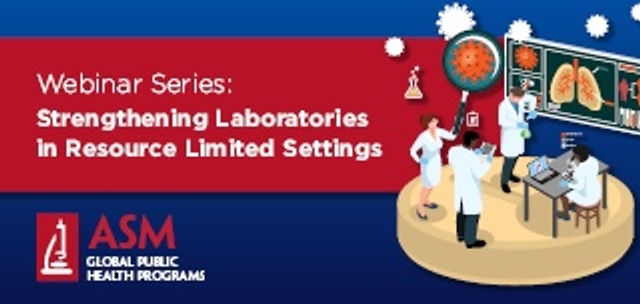Medical Lab Scientist (MLS, MT, MLT, MLS) Webinars
These webinar series include $5 webinars for those who have ASM's Medical Lab Scientist (MLS, MT, MLT, MLS) membership. Purchase this membership at https://asm.org/membership.The AAR Insights...
With over 30,000 members, including researchers, educators and health professionals, the American Society for Microbiology (ASM) is one of the largest life science societies in the world.
IMPORTANT LOGIN INFORMATION: ASM has implemented Single Sign On (SSO) for accessing ASM Events Online. SSO describes the ASM enterprise-wide identity management system which allows multiple websites to recognize the same username and password. If you have an ASM Events Online account and are unable to login, please click here to request assistance related to username and passwords to access your account.
Preparing for Surge Laboratory Capacity in the Event of an Outbreak
The Covid-19 pandemic demonstrated gaps and weaknesses of health systems, particularly laboratory microbiology capabilities and capacity. While tremendous resources...
MicroBio-LEAP Training-of-Leaders Scholars Program Webinar
ASM is launching a new program dedicated to training microbiology leaders to champion DEI within their organizations and institutions.

Arise Firebird Documentary: Webinar Discussion
Come join the ASM Subcommittee on the Status of Women in Microbiology for a webinar discussion around the documentary, Arise Firebird. The discussion will feature...

February 20, 2024: Urine Cultures and Urinalysis in the Young and the Old
Join clinical microbiology laboratory directors in discussing recent journal articles in clinical microbiology. Each month, a group of presenters will discuss 1-2...

April 2024 AAR Insights and Discussion: Antibiotics, Lysins, And Antibodies as Combined Therapies for Multidrug Resistance/Multidrug-Resistant Organisms
This webinar will specifically cover combination therapy and exebascase.

May 14, 2024: Advancing Approaches to Broad Pathogen Detection

ASM Global Public Health Programs Webinar Series: Strengthening Laboratories in Resource-Limited Settings
Gain new insight on strategies and innovative approaches from leading scientific experts. This all-new quarterly webinar series will focus on how microbiology plays an...

Clinical Microbiology Virtual Journal Club
Join us in discussing recent journal articles in clinical microbiology. Each month a group of presenters will discuss one or two articles in-depth. Journal clubs are...

Antimicrobial Susceptibility Testing: 2023 Updates
In this series experts in the field of AST will present the latest information on both introductory and advanced topics to give you the AST information you need to do...

Incorporating DEI in the Lab
Do you want to learn more about incorporating best DEI practices into your lab? Join ABRCMS Online for this new series. Past sessions are available on-demand and new...

Road to Graduate School
Thinking about going to graduate school in STEM? Equip yourself with practical advice from experienced ABRCMS speakers every step of the way. • Taking Advantage of...

Food for Thought: Growing in Graduate School
Grad school is an opportunity to grow but we all can use some help along the way.